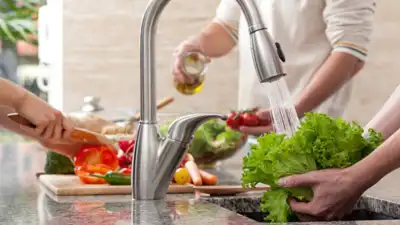ARTICLE AD BOX

So, you just picked up a shiny apple from your grocery haul, gave it a quick polish on your t-shirt, and took a big bite. Harmless, right? Not quite. That innocent-looking apple could be carrying an invisible army of germs—and if you’re not rinsing your fruits and veggies properly, you might be inviting a stomach disaster or worse.We get it. Washing produce sometimes feels like an extra chore, especially when you're hungry or in a hurry. But skipping that rinse could land you in bed with a fever, cramps, or a stomach bug you really don’t want to deal with. Here's why those few extra seconds under the tap are totally worth it.
What’s really lurking on that lettuce?
Let’s start with the basics. Fruits and vegetables go through a lot before they end up in your fridge. They’re grown in open fields, exposed to dirt, dust, animal feces, pesticides, and sometimes even sewage-contaminated water.
On top of that, they’re handled by farm workers, packed into crates, shipped across states or countries, and touched by multiple hands in grocery stores or local markets.By the time that spinach bag or mango gets to your plate, it could be carrying:
- Bacteria like E. coli, Salmonella, and Listeria
- Parasites such as Giardia or Cyclospora
- Chemical residues from pesticides
- Fungal spores and mold
And no, peeling or cooking doesn’t always kill everything—especially if the bacteria has already seeped inside.
Real-life horror stories
This isn’t just a “better safe than sorry” situation. There have been actual outbreaks linked to contaminated produce. A 2011 Listeria outbreak from cantaloupes in the U.S.
led to over 30 deaths. In another case, E. coli from romaine lettuce hospitalized dozens. It’s not just about minor tummy trouble—these infections can be life-threatening, especially for kids, pregnant women, the elderly, or people with weak immune systems.
Why just “looking clean” doesn’t count
Let’s debunk a common myth: If it looks clean, it’s safe.Wrong. Germs and chemicals aren’t always visible. That gleaming apple? It could still be coated with invisible pesticide residue or tiny bacteria just waiting to throw your digestive system into chaos.Wiping with a cloth or just a splash of water isn’t enough either. Most experts agree that a thorough rinse under running water (and a bit of scrubbing where needed) is the best bet.
But I buy organic – Am I safe?
Not entirely. While organic produce might skip the chemical pesticides, it’s still grown in soil, handled by people, and transported just like non-organic goods. Plus, organic farms often use natural fertilizers—like manure—which come with their own bacterial risks.
So yes, even organic fruits and veggies need a wash.
The risky bunch: Produce you really shouldn’t skip
Some fruits and veggies are at higher risk than others. Here are the ones that deserve extra attention:
- Leafy greens like spinach, kale, and lettuce (they trap dirt easily)
- Berries (fragile but often sprayed and handled a lot)
- Apples, pears, and peaches (often coated in wax or pesticide residue)
- Melons (you might not eat the rind, but cutting through it drags germs in)
- Grapes and cherry tomatoes (multiple contact points = more germs)
Even pre-washed or “ready to eat” salads aren’t totally safe. Give them a rinse anyway—better safe than a midnight trip to the bathroom.
So… how should you actually wash produce?
Good news: It’s not rocket science. Here’s how to make sure you’re not munching on microbes:
- Skip the soap – Seriously. Dish soap or bleach can leave harmful residues and make things worse.
- Use clean, running water – Hold each fruit or veg under the tap and rub gently with your hands.
- Use a brush or cloth – For thick-skinned produce like potatoes, carrots, or cucumbers.
- Dry with a paper towel – It helps remove lingering bacteria.
- Wash just before eating – Washing too early can lead to mold growth in storage.
You don’t need fancy fruit sprays or vinegar soaks—just water and a bit of attention go a long way.
What about peeling?
Peeling helps, yes, but it’s not a shortcut to skip rinsing. The outside of a banana or an orange might seem like it doesn’t matter, but when you peel it with your hands, whatever was on the skin gets transferred to the fruit inside. So yep, wash it all—even stuff with a thick peel.
Rinse it, don’t risk it
Look, no one wants to turn every meal into a science experiment or go overboard with paranoia. But when the solution is literally as simple as holding something under the tap for 10 seconds, it’s hard to justify skipping it.Unwashed produce isn’t just dirty—it can actually be dangerous. And while your body’s pretty good at handling small exposures, it’s always smarter to reduce your risk—especially when the alternative could be days of cramps, vomiting, or worse.So the next time you grab a bunch of grapes, a crisp apple, or some juicy strawberries—give them a quick rinse first. Your gut will thank you later.



.png)
.png)
.png)
















 5 days ago
10
5 days ago
10









 English (US) ·
English (US) ·